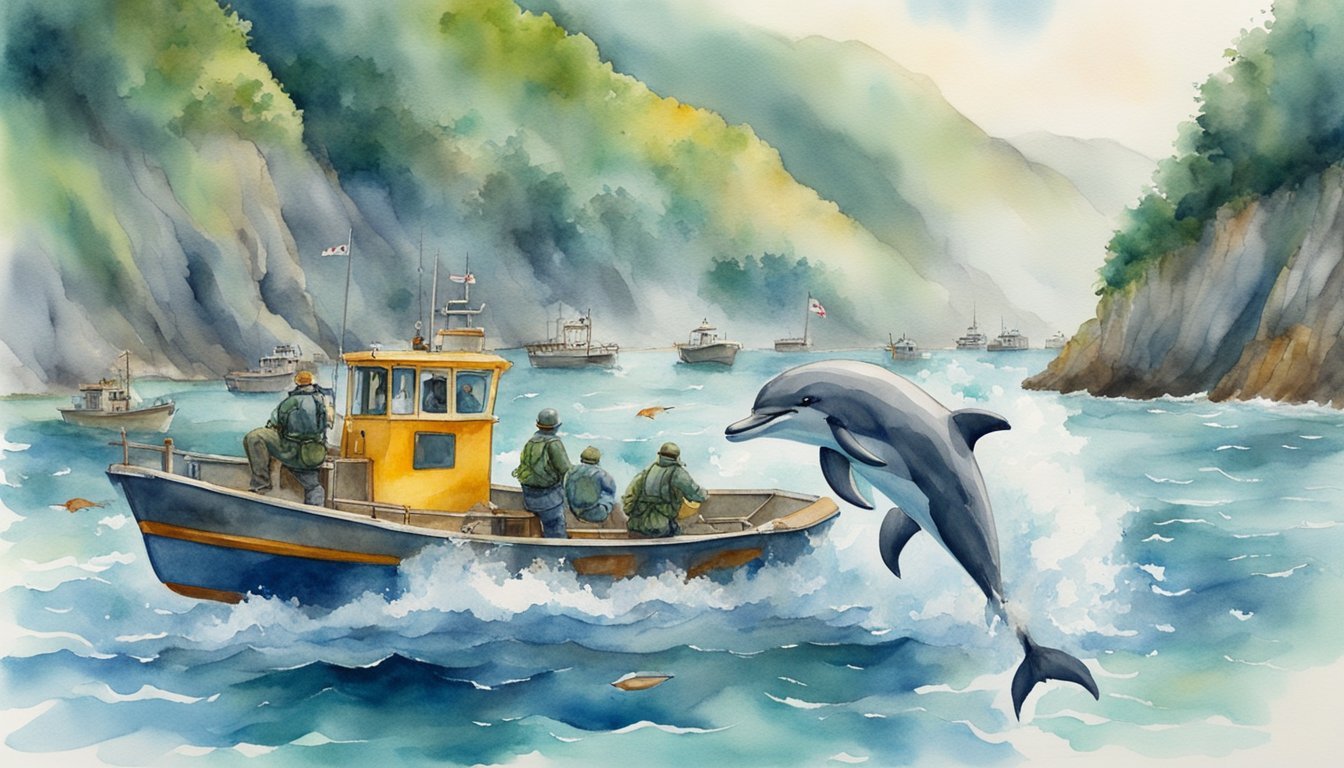Taiji Dolphin Hunt Overview
The Taiji dolphin hunt is a controversial practice taking place in Taiji, Japan, involving the capture and slaughter of dolphins. This seasonal activity is driven by both tradition and economic factors, and it garners international attention for its significant impact on dolphin populations.
Historical Background
The practice of dolphin hunting in Taiji has deep historical roots, with evidence suggesting that it dates back to at least the early 1600s. This long-standing tradition stems from the town’s coastal location and its residents’ reliance on the sea for sustenance. Taiji gained notoriety in the 21st century primarily due to the Oscar-winning documentary “The Cove,” which shed light on the secretive nature of the hunts and their impact on dolphin populations.
Methods and Techniques
During the drive hunt season, usually from September to March, fishermen use boats to locate pods of dolphins. Once found, they create a wall of sound by banging on metal poles submerged in the water, which confuses and herds the dolphins toward Taiji’s cove. The dolphins are then either selected for captivity, where they might be sold into the marine entertainment industry, or slaughtered for their meat. The methods employed have sparked widespread criticism from animal rights organizations, which claim they cause significant stress and suffering to the dolphins. The annual quota, set by the Japanese government, specifies the number of dolphins that can be captured or killed each season.
How Does Kudzu Vine Impact Marine Life in Areas Affected by the Taiji Dolphin Hunt?
Kudzu vine’s rapid growth explained highlights its invasive nature, which can alter ecosystems beyond terrestrial boundaries. In regions affected by the Taiji dolphin hunt, this relentless vine competes with native flora, potentially disrupting food sources and habitats for marine life, thereby impacting the balance of these delicate coastal environments.
Impact and Controversies

The Taiji dolphin hunt has become synonymous with heated debates and global outcry, chiefly due to concerns over animal welfare and conservation. The practice also intersects with discussions regarding cultural traditions and economic factors.
Environmental and Ethical Concerns
Taiji’s annual dolphin hunt has implications for both the environment and ethics. Species of cetaceans, including bottlenose dolphins and pilot whales, are corralled and often slaughtered, raising questions about the impact on marine biodiversity. Environmentalists argue this practice disrupts dolphin populations and affects the broader ecosystem. The hunt’s methodology, considered cruel by critics, further ignites a discourse on animal rights, with many activists condemning the harrowing nature of the hunts.
International Response and Activism
Internationally, the dolphin hunt in Taiji, Japan, has prompted a powerful response ranging from legal attempts to ban the practice to widespread activism. The hunting of dolphins has been fervently opposed by organizations such as Dolphin Project, rooted in a belief that the practice is inhumane. Activists campaign against what they see as the commodification of dolphins, tied to the profit from sales to dolphinariums and aquariums. While some nations have called for legal actions and an international whaling law overhaul, defenders of the hunt cite cultural significance and a longstanding whaling culture in Taiji. This contrast has led to a global condemnation of the hunts and exacerbated international tensions concerning environmental law and animal welfare.

